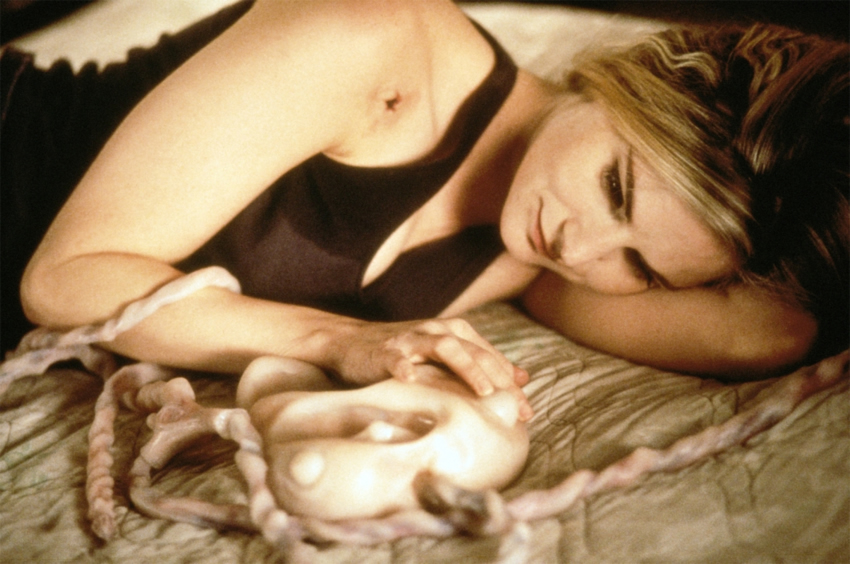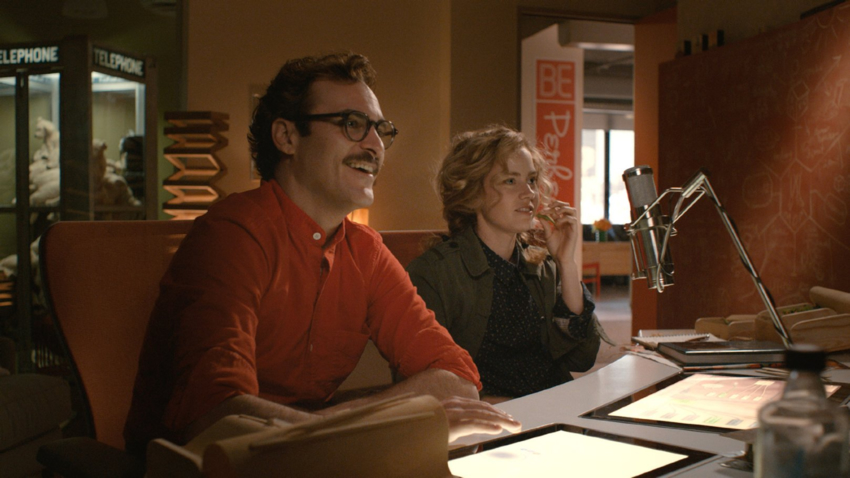We don’t see many women game designers in fiction. So I was really surprised when I discovered Amy in Spike Jonze’s Her, and happy to see that female game designers become something real even outside the game industry. I immediately liked her. And I tried to remember if I had ever seen another character like her. I could only think of Allegra in Cronenberg’s eXistenZ. These two characters seem totally different, one is built of so many fantasies and the other of many little truths… But they share the same uncertainty about identity, power and relationships. And I feel that the fact that they are both game designers AND women brings a lot to the stories.

Allegra Geller is « the best game designer in the world », if such a distinction means anything at all. She’s an avant-gardist genius, and her work is worth industrial espionage, conspiracies and attempted murder.
Her games use organic devices that require to be plugged directly into the player’s body, through a “bioport”.
When she connects herself to the device, it’s showed as something weirdly erotic and sensual. Allegra seems somehow addicted to the feeling, and physically attracted to the device. She also uses Jude Law’s character in her pre-game foreplay, but only if he accepts to get this additional hole in his body.
Everything related to these gaming devices is organic, feels like skin or bones, everything seems a little dirty, wet and sticky. The bioports can even be infected and transmit diseases from within the game. The machine becomes half-human while the Humans accept to lose part of their free-will when they’re in the game, playing a scripted scenario through their avatars.
Playing a game seems to be something morbid, weird, a little disgusting, fascinating, a fetishist exploration of the twilight zone where life and death, real and virtual overlap, where bodies and toys are the same, where you accept to lose control and become someone else’s thing, or where you’re the one designing reality for the others.
I feel that Allegra being a woman allowed Cronenberg to push this almost sexual player/designer relation to the extreme, looking for the thrilling moment when you’re not sure if you’re playing or if you’re being played with. Something we are yet to experience in virtual reality games.

Amy is nothing like Allegra. She’s not famous, she’s not a game design genius. She’s just a simple designer working for a company that makes casual games “for women”. We can see her explaining the game concept to Theodore: you play as a woman who must become the perfect mother. You have to feed the kids the right breakfast, and drive them to school before everybody else… If you fail, you lose points and are a bad mother. It feels exactly like so many real time management games, Dinner Dash and the likes.
Amy has nothing to do with her game’s character: she’s not a mother, she doesn’t wear pretty dresses, and above all she doesn’t want anybody to expect her to behave in a specific “perfect” way. That’s the reason why she decides to suddenly end her marriage.
She doesn’t really enjoy the games she has to make, but that’s a living, isn’t it? She dreams of becoming a documentary filmmaker, but she’s too shy to show anybody her first attempts.
In one of her documentary projects, she filmed her own mother while she was sleeping. Amy explains vaguely that we spend a third of our lives asleep, and that maybe it’s the only moment when we really feel free. Quite the opposite of the hyperactive mom in the race for perfection.
Amy jokes about the game, and reveals she has snuck some secret actions in it, like the perfect mother masturbating against the perfect kitchen’s fridge.
I really could relate to Amy’s character: not knowing exactly what you want but being sure you don’t want anybody to tell you, having something to say but looking for the right means to express it…
I liked seeing her at her desk, explaining the game mechanics in front of a big brown board covered in flowcharts and notes. I liked seeing her joking on this stupid perfect clichéd woman she has to make a game about, and the real, lonely, doubtful woman that she is herself.
A reminder that society is a shape-fitting game, and that sometimes you’re not sure if you fit anywhere. You have to deal with rules and constraints, and cheat a little when you need some air, or even retreat in sleep or in a « virtual » friendship with an AI. But what keeps you going is this idea that sometimes you get to be the game designer, and create your own rules, your own world, and your own way to play.
I hope to see more fictional women game designers in the future, as there are more of us each day in real life.
Leave a Reply